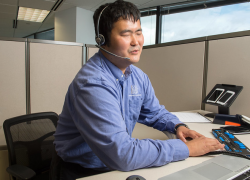According to the National Alliance on Mental Illness, one in five American adults experiences a mental health condition each year. The challenges of the pandemic, coupled with a greater understanding of mental health conditions, have spurred many employers to promote mental health-friendly workplaces and workforce services in the past year.
This is not a new issue for the Office of Disability Employment Policy, now celebrating our 20th year. Since our inception in 2001, we have:
-
Strengthened the capacity of our nation’s workforce development system to increase employment opportunities for people with mental health conditions, including veterans and women with disabilities who have experienced trauma.
-
Led federal interagency efforts on ensuring employment is recognized as an integral part of recovery — and making sure it’s factored into evidence-based holistic approaches to mental health services.
-
Helped employers foster mental health-friendly workplaces to ensure workers can succeed on the job.
In 2018-2019, our Employer Assistance and Resource Network on Disability Inclusion (EARN) conducted a review of literature on workplace mental health as well as qualitative interviews with a range of companies about mental health initiatives. This research led to the creation of EARN's Mental Health Toolkit and the "4 A’s of a Mental Health-Friendly Workplace,” an employer action framework based on four key areas of leading workplace mental health practices.
These efforts provided good foundation for responding to employers’ increased concerns about worker mental health in the face of COVID-19. Over the past year, EARN, as well as our Job Accommodation Network (JAN), have helped educate employers about strategies for supporting workers with mental health conditions — including those with increased stress and anxiety due to COVID-19 — through a wide variety of publications, articles, webinars and success stories.
We also launched the Advancing State Policy Integration for Recovery and Employment (ASPIRE) initiative earlier this year to leverage guidance from mental health experts that can help states increase employment for people with mental health conditions.
We hope the increased attention on worker mental health outlasts the pandemic, and stand ready to help employers build supportive workplace cultures. We also remain committed to helping people with mental health conditions find and succeed in employment.
For so many people, both with and without mental health conditions, work is a key part of health, contributing to a sense of purpose and wellbeing. I know it is for me and my dedicated colleagues at ODEP. That’s why for 20 years we’ve worked to bring this issue to the forefront — and will continue to do so in the years ahead.
Louis Orslene is a supervisory policy advisor in the department’s Office of Disability Employment Policy.

 U.S. Department of Labor Blog
U.S. Department of Labor Blog



